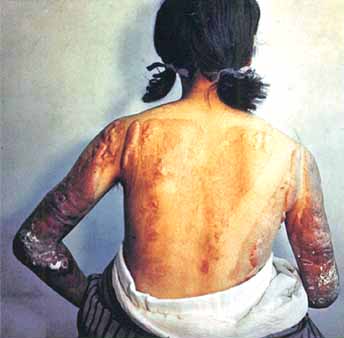Fighting against radiation sickness - Kikue Miyamoto I transferred with my child from Northern Kyushu to Funarihon-machi, Hiroshima where my mother lived I was twenty years old. It was the morning of August 6th in Hiroshima. An air-raid alarm was sounded. I heard an aeroplane flying. I thought It was a B-29. My mother was going to the bathroom. Suddenly the blast sounded. The inside of the house became just as white as if we had lit magnesium. At that moment I instantly pulled my child towards me, and we were blown to the floor. We tried to stand up but could not as the house had collapsed I thought, “I am going to die” and lost consciousness. I regained consciousness as my baby was crying. We were trapped under a beam and could move but not get out. People say one often has more strength in an emergency. It is perhaps with this that I managed to free myself and get out of the house. Out side my mother was repeatedly calling for my sister. At first I did not recognise her as her face had changed. Her voice was the same but her face was completely different to what it was several minutes ago. “Are you Mum?” I asked involuntarily, “Why don't you recognise your mother” she said angrily. My younger sister was standing there, sooty and bleeding from her face and arms. We escaped to the bank of the river, dug a hole in it and hid. Many people were evacuating to the bank and the City was on fire. When the bank became too dangerous we went under the bridge. Many injured people sat down there. It suddenly became dark as night and it began to rain. I saw a woman holding something covered in blood and wondered what it was. Talking to her she told me that she had been trapped in a house and could get out but her child was trapped. The house was on fire and pulling with all her strength she pulled the child out. The child's skin had peeled off and it had already died. However the woman too shocked to know was still holding on to it. The next day we went to a medical tent to get Onigiri (rice balls). I saw people lying down asking for water. Their faces were so swollen. I could not find their noses or mouths except when they opened them to ask for water. A helper fed them from the spout of a kettle. On the second evening after the blast helpers carried my mother to a bamboo thicket in Misasa because her face and legs were burned. A lot of beds made from the bamboo thickets were placed side by side. Patients covered their eyes, noses and mouths with gauze bandages. The helpers applied Rivanol a brand of acrinol instead of medicine. The next day people were in trouble. The bandages would not come off.
A few days after the end of the war my mother and other patients were taken to the Atomic Dome (Honkawa Elementary School) by truck. My daughter had many blisters on her body by the 5th day after the blast. She was in severe pain as only eight months old her skin was so tender. I was also suffering from diarrhoea and bleeding from the gums. I was weak and received a certificate of affliction. I had many injections in order to return to Kyushu. My family got on the train at Koi Station by crawling through the train window because it was so crowded. On the way home I saw the lights of the houses and felt an overwhelming relief in seeing them. Five years after I returned my daughter had a high fever, bled and died. She had suffered and had died of radiation sickness. I myself was ill in bed for a year. I have been ill ever since the bombing and have kept a clinical record of my illness and have been in and out of the Prefectural University Hospital since the 1960’s. When we returned home from Hiroshima I also had two sons. My eldest son died at the age of four due to an unusual constitution. My second son entered a hospital in Hakata at the age of thirteen. His white blood cell count was up to 20,000 and could not go to school for his second term. He is still in poor health but did marry and has a family. In my case I do look well but take medicine and am really quite ill. The condition of my thyroid is gradually worsening. I have been critically ill a few times now to the extent that I no longer worry. War must be avoided absolutely. If we can be careful to avoid it this kind of tragedy will not happen again. I hate war and still have terrible dreams about it. Governments have to learn to avoid such situations. Wars are the result of greed and without greed there would be world peace. I wish for this for coming generations and in not having to live a miserable life. To have to see the wounds on ones mothers face. To have a younger sister dead at the age of 41. After the interview: We looked at Mrs. Miyamoto’s clinical records. It just seems unbelievable that she that she has fought against these illnesses and withstood the terrible experience of losing two children. We felt she had managed because she has a positive way of living. Even now when her condition is bad she gets out of her bed a goes to study how to draw, as she loves drawing. She showed us some wonderful pictures and we hope someday she will be able to hold an exhibition. February 21st 1995 - Interviewers, Naomi Hashimoto of Yahata-nishi and Yoshiko Kobayashi of Yahata-higashi (Kitakyushu City)
|
